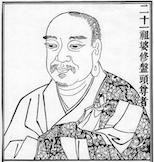Koso Wasan 20
On reaching the land of the Vow,
We immediately realise supreme nirvana,
And thereupon we awaken great compassion.
All this is called Amida's 'directing of virtue.'
Supreme Nirvana

Supreme nirvana (mujo nehan, Sk. parinirvana) is often associated with the attainment reached by Shakyamuni after his demise. However, this is only one of its meanings. In the fourth book of the Kyo Gyo Shin Sho ('realisation'), Shinran Shonin draws heavily upon both Vasubandhu's Ojo Ron and T'an-luan's commentary on it to demonstrate his understanding that 'supreme nirvana' is a synonym for the 'unconditioned dharmakaya'. There is no more exalted and thorough-going attainment than this.
The verses on Vasubandhu finish on a high note: the attainment of dharma body; the full realisation of compassion and the inevitable return to samsara as an enlightened being who is able to teach the dharma eloquently and to exercise transcendant powers for the sole purpose of alleviating the suffering of others.
Shinran's depiction of these future developments is an acute interpretation of the Pure Land way and is entirely faithful to Vasubandhu's outline of the way to nirvana. However, it is useful to remember that Vasubandhu is writing from the perpective of an enlightened sage, whereas Shinran is an ordinary person, even though he has awakened to Amida Buddha's true shinjin. For Shinran, there is absolutely no possibility of realising supreme nirvana until he is born in the Pure Land.
When one attains supreme nirvana one is released from all subjectivity, and becomes the embodiment of compassion. It is not until this point that we become compassionate, since compassion in Buddhist terms is not mere 'empathy' or 'sympathy' - both of which are encouraged in the dharma as divine abodes (Sk. brahma vihara). Compassion is complete identification with the 'other'.
Compassion is a word that is often used in everyday discourse but it literally means 'suffering with' - as though we were experiencing life exactly as the object of our compassion does. This makes compassion a very good translation of the Sanskrit word karuna. Compassion is, to my mind, not the same as 'love', even though love comes close when it is, for example, agapé- kindred love, or kindness. Love, nevertheless, retains the distinction between the one who loves and the one who is loved, whereas the Buddhist sense of compassion is quite free of both conscious distinctions and also attachment to the actions which flow from it.
There is no expectation in the Pure Land tradition that we should practice or express compassion until we attain supreme nirvana in the Pure Land. It is not possible for a person bound to samsara and their kleshas (mental afflictions) to understand compassion properly. As we have already seen in the Jodo Wasan, the only way we can genuinely 'practice compassion' is in our nembutsu, whereby we express the compassion of Amida Buddha and its working in our hearts.
We may be tempted to question the social relevance of the Pure Land way if we are not able to express genuine compassion in our present lives. However, it seems a shame to diminish the profound meaning of the compassion that is released upon the attainment of supreme nirvana and to risk trivialising the actual significance of compassion in the context of the Buddha Dharma. Readers will remember that Shinran suggests in his letters - and also in one or two of the pamphlets that he published - that although we are incapable of being truly compassionate, it is possible for us to express our deep appreciation of Amida Buddha's compassion in a warm, affectionate and loving attitude to our fellow nembutsu followers1.
In this, Shinran is only following the counsel of Shakyamuni in the Larger Sutra. Here, he exhorts us to be loving and kind, especially to those with whom we are karmically bound - our families and friends. In this way we can genuinely express a sort of samsara-bound - and human - reflection of the true compassion that arises at supreme Nirvana.
1: CWS, p. 551f.